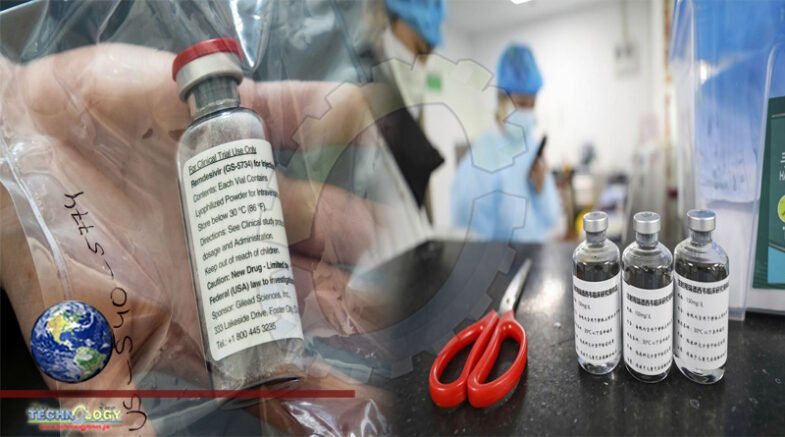European Union earlier this month to renegotiate its contract with Gliead Sciences Inc for the anti-viral drug remdesivir, a report by the magazine Science has found that the deal and the approval granted by the US Food and Drugs Administration (FDA) to treat COVID-19 patients came under “unusual circumstances”.

The results of a large clinical trial supported by the World Health Organisation (WHO) were announced on October 15, showing that remdesivir does not reduce the mortality or the time COVID-19 patients who are administered the drug take to recover.
A week after the Solidarity data was published online, the FDA approved remdesivir for use – the first drug to receive the nod in the US. While Gilead Sciences Inc, the company which produces the drug, has questioned the validity of the data provided by the Solidarity trial, Science has found the FDA did not consult a group of outside experts that it usually approaches to weigh in on complicated antiviral drug issues.
“This is a very, very bad look for the FDA, and the dealings between Gilead and EU make it another layer of badness,” Eric Topol, a cardiologist who objected to remdesivir getting the FDA’s approval, told Science.
While the FDA is not obligated to convene the Antimicrobial Drugs Advisory Committee (ADAC), the outside panel for its decision, one of its members, David Hardy, was “amazed” that the agency did not do so in the case of remdesivir. “This sets the standard for the first COVID-19 antiviral,” he said. “When it comes to the point of giving pharmaceutical companies exclusive marketing rights in this area, that really is something that’s very, very important. And there does need to be more than just governmental input.”
In the early days of the pandemic, remdesivir emerged as a candidate to help treat COVID-19 patients. Study results released by the US’s National Institutes of Health in late April showed that the drug shortened hospital stays of people with severe cases of the infection, especially if administered early. Two other studies, both sponsored by Gilead, also showed encouraging results but their design has come under the scanner – they did not compare the treatments with a placebo.
The results of the Solidarity trial threw up more doubts about the benefits of remdesivir and had a larger sample spread over 30 countries. Even so, Gilead questioned the results, saying “it is unclear if any conclusive findings can be drawn from the study results.”
Investigators in the Solidarity study were “angered” by this criticism, with Science reporting that Marie-Paule Kieny, director of research at the French medical research agency INSERM, saying, “It’s appalling to see how Gilead tries to badmouth the Solidarity trial… Pretending the trial has no value because it is in low-income countries is just prejudice.”
WHO’s chief scientist Soumya Swaminathan also pointed out that nearly 50% of the Solidarity trial patients were from Canada and Europe, where the quality of health care is high.
Experts worry that the FDA approving remdesivir despite questions about its efficacy could mislead people into thinking that the drug “must work”. Dr Aaron S. Kesselheim, a professor of medicine at Harvard Medical School, told the New York Times that it is important to recognise that the FDA’s approval “doesn’t guarantee a certain level of benefit — all it says is that there is some benefit.”
Richard Peto, an Oxford epidemiologist who helped design the Solidarity trial, told Science that the trial cannot prove whether “remdesivir has zero benefit for COVID-19”. He said trials produce “confidence intervals” and not just “point estimates”. Peto added:
“Gilead and the FDA have sort of manoeuvred us into a position where we’re being asked to try and prove remdesivir does nothing rather than asking the usual way round, which is, ‘Can the manufacturers prove it does something?’”
To add to the difficulties, the WHO has also flagged remdesivir’s potential adverse effects. In late August, the organisation noted that COVID-19 patients receiving remdesivir reported a disproportionately high number of liver and kidney problems.
For these reasons, many scientists are firmly of the opinion that the FDA should have consulted its panel of outside experts for a “vigorous debate” before remdesivir was approved for treatment. ADAC chair Lindsey Baden said the panel of experts could have “elevated the discussion”. He told Science:
“Hydroxychloroquine, convalescent plasma, remdesivir – these are complicated decisions given the imperfect nature of the data upon which the decisions are being made, and the urgency of the clinical use gives all the more reasons to have an open discussion.”
Meanwhile, Gilead’s dealings with the European Commission has also been questioned. Gilead knew about the results of Solidarity since October 6, but did not reveal this information to the EU before signing a deal worth over $1 billion to provide remdesivir for six months on October 8.
While Gilead told Reuters that it had received a “heavily redacted manuscript” from the WHO which contained different information from the published document, the organisation has denied these claims. WHO said the only information blacked out was results relating to the other drugs which were also tested in the trial.
Experts have already urged the EU to renegotiate the deal, if not pull out entirely.
Originally published at Science
